How Does A Cell Phone Signal Booster Work?
Cell Phone Signal Boosters Explained
We often get asked how cell phone boosters work and if they actually work. With so many junk booster out on the market, it makes scenes to be skeptical about a device that claims to improve cellular signal strength. In this article, we'll be answering those questions and more.
We fix poor cell phone signal! Find the right signal booster for you:




In this Blog:
- What is a Signal Booster?
- How Do Cell Phone Boosters Work?
- Do Signal Boosters Really Work?
- Will Signal Boosters Work in Rural Areas?
- How Do I Know if a Signal Booster Will Work for Me?
- When Will a Signal Booster NOT Work?
- Home & Vehicle Signal Boosters that Actually Work
- Other FAQs
What is a Signal Booster?
A cell phone signal booster is an electronic device designed to improve 5G, 4G, and LTE cellular signals inside homes, businesses, and vehicles. They enhance signal strength by up to 32 times for better talk, text, and data.
If you have usable signal outside your building or vehicle, but weak to no signal inside, cell boosters definitely help. The same applies to those who have very weak cell signals outside and inside.
How Do Cell Phone Boosters Work?
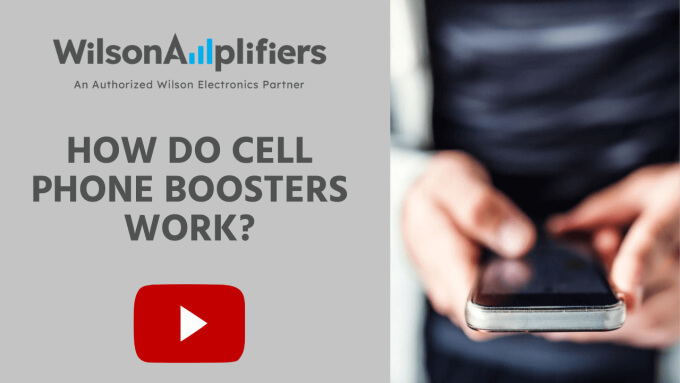
A cell phone signal booster (also known as a cell signal extender, signal amplifier, cell phone repeater, or cell phone antenna booster) works by:
- Pulling in your existing outside signal,
- Boosting it,
- And rebroadcasting it into desired areas.

Pulls in tower Signal

Amplifies the Signal

Re-broadcasts signal

 Cellular Device
Cellular Device
Gets Boosted signal

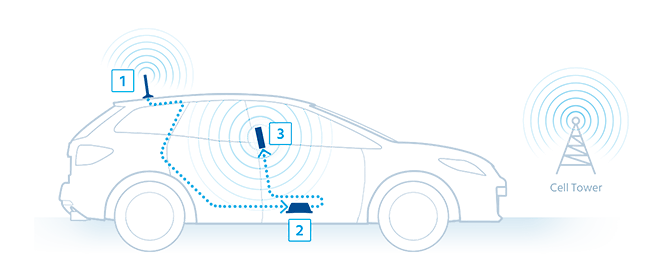
Pulls in tower Signal

Amplifies the Signal

Re-broadcasts signal

 Cellular Device
Cellular Device
Gets Boosted signal

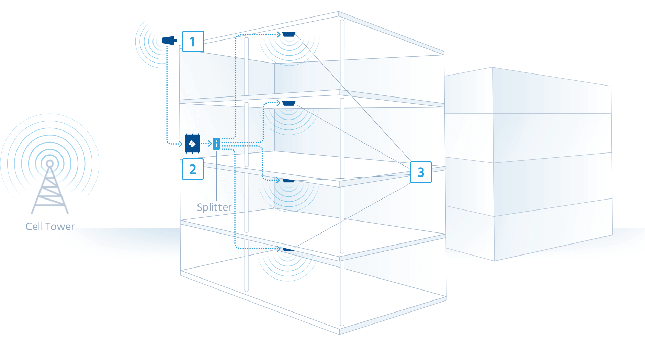
Pulls in Tower Signal

Amplifies the Signal

Re-broadcasts Signal

 Cellular Device
Cellular Device
Gets Boosted Signal

Cellular devices automatically pick up the amplified signal. The frequency of failed texts, dropped calls, and slow data significantly decreases or stops.
Boosters also work in reverse. The unit receives outgoing signals from nearby cellular devices and sends them to your closest cell phone tower. This increasing the odds that the signal reaches it without failing.
There are different types of boosters available targeting different needs:
- In-Building Signal Boosters – Designed for homes, offices, and commercial buildings.
- Vehicle Signal Boosters - Designed for cars, trucks, RVs, SUVs, boats, and fleet vehicles.
For a cellular amplifier to work, there must be existing signal, even if it's weak, outside your home, office, or vehicle. These units enhance existing cellular signals, not create them.
Here is a detailed explanation of the workings of each component used to transform your cellular connection:
1) An Outdoor Antenna: Captures Existing Cell Phone Signal
The outdoor antenna (also called a donor antenna) is the first major component of cell phone boosters. It captures weak 5G/4G/LTE signals that are then sent to the amplifier for boosting.
There are two types of outdoor antennas:
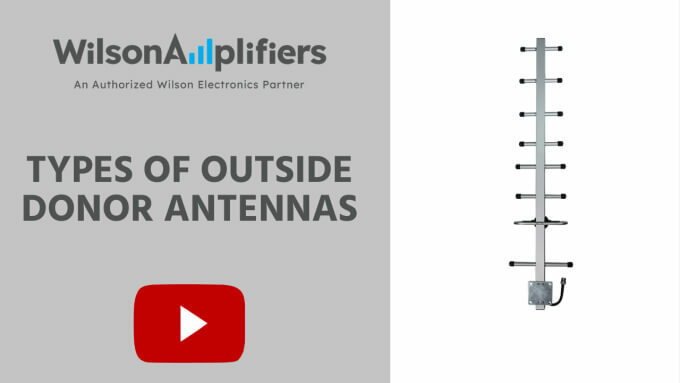
Omni-Directional Antenna: This antenna pulls in signals from every direction. It has a 360-degree beam. They are best for:
- Homes and offices with medium to strong outside signal
- Homes and offices with multiple nearby cell towers to boost multiple carriers
- Vehicles in motion
Uni-Directional Antenna (the most common being the Yagi antenna): This antenna (shaped like a triangle) pulls signal from one direction. It has a 45-degree beam. They are designed to point at the nearest tower. Having a more focused signal allows the antenna to reach farther than an omni. A specialized performer used for:
- Homes and offices with poor signal
- Homes and offices that only want to boost a single carrier
- Stationary RVs
The location of donor antennas is crucial. It can affect the power of the signal the amplifier receives.
2) An Amplifier: Boosts Cell Signal
The amplifier is the second major component of a signal booster. It receives the signal from the outside antenna and, as the name suggests, amplifies it.
To understand how amplifiers work and how to choose the best booster kit, you'll have to be familiar with different terms.
Gain
Cellular signal can only be amplified up to the signal booster's gain value, measured in dB (Decibels). The gain is applied to the captured signal, improving signal strength, which is measured in dBm (decibel-milliwatts). The closer you are to -50 dBm, the more reliable your signal is.
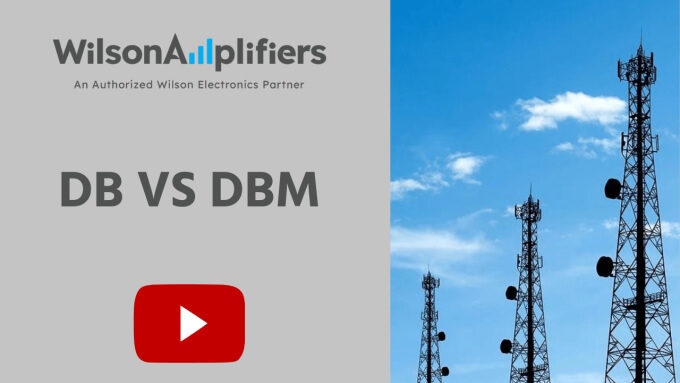
The actual amplification power you receive will depend on your existing signal strength. If you have weak outside signal, the booster will apply more gain. On the other hand, if you have strong outside signal, the booster will apply less gain. This prevents overloading the unit and interfering with nearby cell towers.
Typically, a good multi-carrier home amplifier should have at least +60 dB gain. The most powerful multi-carrier units top out at +72 dB gain. A good multi-carrier car amplifier should have at least +25 dB with the best units topping out at +50 dB.
To achieve desired boost, we recommend measuring your signal strength and talking to a certified signal booster expert.
Coverage Area
All amplifier kits vary in how many square feet they can blanket with enhanced cell reception. The coverage you receive largely depends on a variety of factors, such as:
- Signal booster type
- Indoor antenna type and quantity
- Existing signal strength
- Building layout
A cell phone amplifier designed for small homes and offices can cover up to 2,500 sq ft. Those for medium to large homes and offices range from 5,000 to 7,500 sq ft. Commercial amplifiers can cover areas up to 100,000 sq ft. The above numbers are based on optimal conditions, and are unlikely to reflect reality.
If your signal is on the weaker end, coverage will be significantly reduced. Buildings with closed floor plans will also receive less coverage, even with strong outside signal. Walls and furniture can prevent the broadcasted signal from reaching every necessary corner. To really maximize coverage, multiple antennas may be needed.
3) An Indoor Antenna: Rebroadcasts Enhances Signal Inside
The inside antenna is the third major component of a cell booster. Once the amplifier has done its thing, the boosted signal is sent to the inside antenna(s) for rebroadcasting into the desired areas.
There are two types of in-building antennas:
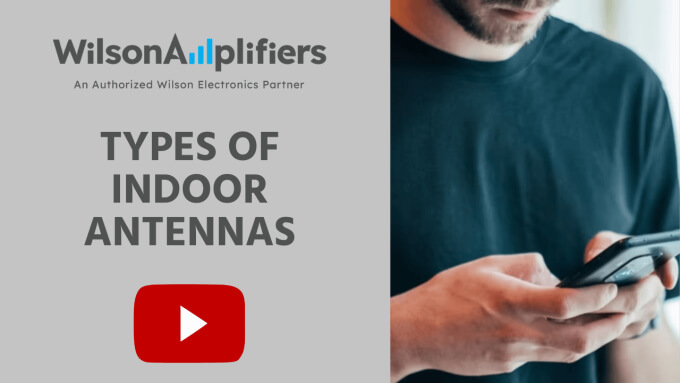
A panel antenna is directional and generally wall-mounted. Its signal beam ranges from 45-70 degrees. The strongest signal will be available in the areas closest to it before reaching lower-priority areas.
On the other hand, a dome antenna is omnidirectional and generally ceiling-mounted. It distributes signal equally in all directions. They work best in large, open areas.
The majority of in-building weBoost signal boosters by Wilson Electronics use panel antennas. But, depending on your cell phone booster system kit, some manufacturers prefer one style of indoor antenna over the other.
In-vehicle signals boosters are predominantly paired with directional low-profile indoor antennas.
4) Coaxial Cable: Relays Signal
The coaxial cable connects all components. It’s what carries the signal between the cellular antennas and amplifier. They're designed to deliver high-frequency electrical signals with low signal loss.
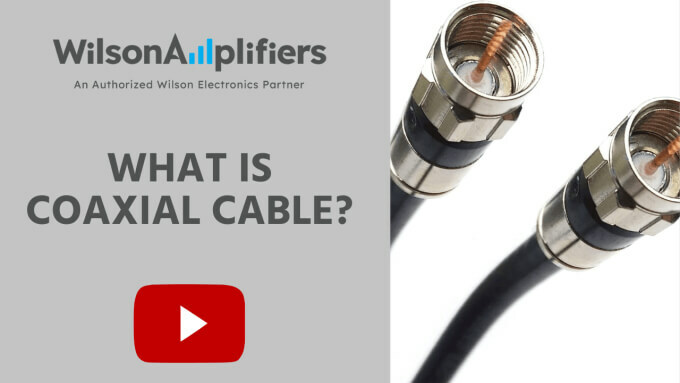
Do Signal Boosters Really Work?
As long as you have a sliver of 5G, 4G, or LTE signals, FCC (Federal Communications Commission) and IC (Industry Canada) certified signal boosters, like those from weBoost and WilsonPro, do work as claimed. They’ll improve your signal strength for reliable calls and faster data.
You don't have to take our word for it, though. Check out what one of our customers had to say after installing a cell booster in his rural East Texas home.
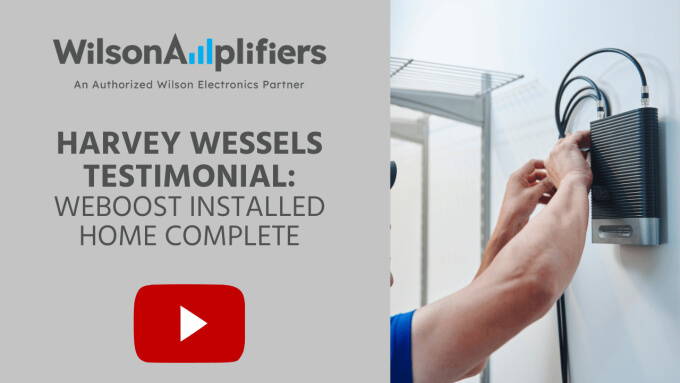
Before installing the unit, our customer's signal signal strength ranged from -116 to -119 dBm. After the installation, signal strength significantly improved to -75 dBm. The booster transformed our customer’s home from a near-dead zone to one with above-average cell reception. For the full story, check out our weBoost Installed Home Complete Review.
A test conducted on the Colorado Mountains with the weBoost Drive Reach by a user also shows major improvements. Here are the results:
| Without Drive Reach | With Drive Reach |
| 1 Bar of Service | 3 Bars of Service |
| 2.37 Mbps Download & 0.03 Mbps Upload Speeds | 22.6 Mbps Download & 1.74 Mbps Upload Speeds |
For the full video review, click here.
The only time a signal booster will not work is if there is no existing cellular signal. They amplify cell signals, not create them. They also don’t boost landline WiFi signal (the U-verse, Time Warner kind).
Will Signal Boosters Work in Rural Areas?
Cell phone boosters are designed with weak signal environments in mind. Thus, they will definitely work in rural areas where cell signal is present. Both tests featured above were conducted in rural locations. Here you'll find the best cell phone signal boosters for rural areas.
How Do I Know if a Signal Booster Will Work for Me?
Cell phone signal booster will work for anybody who:
- Has existing 5G, 4G, and LTE signals outside, even if weak.
- Has poor to non-existent cell reception inside their home, office, or vehicle.
- Wants to boost cell service indoors for all cellular-enabled devices.
When Will a Signal Booster NOT Work?
Cell phone boosters will not work for you if:
- There is no cell signal outside your home, office, or vehicle.
- You’re trying to improve outdoor cell reception as they’re not designed for that.
- You’re trying to enhance your broadband internet connectivity.
Home & Vehicle Signal Boosters that Actually Work
All of our recommendations below are FCC-approved and work with all North American carriers. They've improved cellular connectivity for hundreds of customers in the United States and Canada.
Best Cell Phone Boosters for Homes and Offices

Most popular. Perfect for most homes. Offers up to 5,000 sq ft of coverage.
Buy Now at $569.99
Most powerful. Includes professional installation. Offers up to 7,500 sq ft of coverage.
Buy Now at $1,299.99
Most affordable. Perfect for small homes and spot coverage. Offers up to 2,500 sq ft of coverage.
Buy Now at $349.99Best Cell Phone Boosters for Vehicles



Cell Phone Booster FAQs
What are the Benefits of a Signal Booster?
For a more in-depth description, check out our full article on the benefits of a signal booster, but in a nutshell:
Benefits:
- With "enough" poor 5G & 4G signal, cell phone boosters can absolutely rock. Read some independent reviews about our services and products .
- Eliminate dropped calls, undelivered texts, sluggish internet connections, and poor reception.
- Improved cellular coverage
- Work with all cellular devices (iPhones, Android, tablets, hotspots, notebooks, etc.)
- Work with all major and local carriers in the US and Canada (AT&T, Verizon, T-Mobile, Bell, Rogers, Telus, etc.).
- One-time purchase, no monthly fees.
- Standard two-to-three-year warranty on most signal boosters from reputable manufacturers.
- Lifetime tech support.
- 30-day better signal or money-back guarantee.
Drawbacks:
- Installation takes a certain level of handiness. Not much, but some.
- If you live in a near-dead zone, you might have to get a more powerful and expensive model.
Are Cell Phone Antenna Boosters the Same as Cell Phone Signal Boosters?
Yes. Cell phone antenna boosters are essentially the same as cell phone signal boosters. While some may use the terms interchangeably, cell phone signal boosters is more common to use. They boost cell phone signals (hence the name) for better cellular reception and connectivity.
What Type of Cell Signal Boosters are There?
There are two types:
- Analog Signal Boosters - The most common cellular signal boosters today are analog ones. These amplify all types of cellular signals across all bands, allowing them to work with all major cell service providers. These are also known as wideband cellular repeaters, cellular amplifiers, bi-directional amplifiers (BDAs), and, of course, signal boosters. weBoost signal boosters are all analog.
- Smart Signal Boosters - These are newer types of boosters attuned to specific frequencies. These are programmable, and generally quite advanced. Some smart boosters can improve signal up to 100 dB. Certain WilsonPro signal boosters are considered "smart."
Are Signal Boosters Legal?
All signal boosters sold on Wilson Amplifiers are certified by the FCC, meaning they are pre-approved and perfectly legal. There are a lot of non-legal, junk signal boosters out on the market that can disrupt the cellular network. Many of which you might find on Amazon or eBay.
Will a Signal Booster Work on My Network Carrier?
Cell phone boosters certified by the FCC and IC work with ALL major and local carriers in USA and Canada.
Do I Need to Have an Internet Connection for a Signal Booster to Work?
No, they do not need WiFi or a landline internet connection to work. They simply boost cellular signal.
Do Signal Boosters Have Monthly or Recurring Fees?
Nope! Signal boosters are a one time purchase. Once you’ve got it set up, it just works.
Will a Signal Booster Improve Data Speed?
By improving your cellular connection, signal boosters can help improve data speeds.
Will a Signal Booster Cause an Increase in Data Rates?
Signal boosters do not use data. Though, by improving your cellular data connection, you may end up using more data.
Do I Need to Pair My Phone to a Cell Phone Booster for it to Work?
Nope! Your phone will automatically pick up on the boosted signal. You don’t have to go through your settings to connect to the booster. Even better, there is no password required (that’s one less password you need to remember). Any device within the signal booster's coverage area will see an improvement in signal strength.
Can I Use a Signal Booster While Hiking?
Unfortunately, no current amplifiers are equipped with a battery per FCC regulations. Even if they were, since boosters are designed to be used in a confined space, you would not see much difference.
Do Signal Boosters Work with Solar Panels?
A signal booster cannot be used directly with a solar panel, as it uses a specific power and voltage. However, you can use it with power DERIVED from a solar panel if it's the main source of power.
A Cell Tower Signal is Received by the Booster, Amplified, and Rebroadcasted. How Does the Phone Know Which Signal (Tower or Booster) to Respond To?
It will latch on to the strongest source. Since the booster is in closer proximity, it will pull signal from the booster.
Why are Cell Phone Signal Boosters Sold as Complete Kits?
In 2013, the FCC passed a rule mandating that cell boosters be certified with improved designs to avoid interference with carrier networks.
Back in the wild west days of cell boosters, some unregulated third-party units caused serious network interference issues.
Because of those bad eggs, cell carriers and reputable signal booster manufacturers requested tougher regulations and accountability. Thus, creating a standard for signal boosters. This lead to better performing and carrier-compliant boosters.
So beginning in 2013 and moving forward, all cell phone signal boosters have been and must be FCC-certified.
As a result, amplifiers cannot be sold separately. Parts also cant be swapped in and out, or mixed and matched. All three major components are considered one unit.
This is why it is impossible for retailers and online sellers to only sell you an amplifier. The FCC considers the complete kit as approved and not individual parts, especially the amplifier.
However, this doesn't limit customers from purchasing additional antennas, splitters, and other parts to tailor their coverage.
Are the Boosters Waterproof?
The outdoor antennas are waterproof. The amplifiers and indoor antennas must be placed in a moisture-controlled environment. So, unfortunately, boosters units are not waterproof.
Will a Signal Booster be Compatible with My Device?
Cell phone repeaters are designed for use with all cellular devices, so, yes. Your hotspots and the like are covered as well.
Do Signal Boosters Boost WiFi?
Not directly, but if you buy a 4G booster you should see considerably faster data speeds. It will not boost WiFi on any other devices, but can indirectly via a jetpack or hotspot.
Do Signal Boosters Boost 5G?
Yes, but only low-band 5G. Read more about it here.
Ready to Boost Your Cellular Signal?
Now that you know how signal boosters work, and that they actually work, we can help find the right one for you.
Wilson Amplifiers is the leading provider of FCC-certified cellular amplifiers. Our home, office, vehicle, and enterprise units work with all North American carriers and devices. They're also 5G ready. Once installed, poor cell reception and slow data won’t plague your home, business, or vehicle anymore.
Call us(1-800-568-2723), email us (sales@wilsonamplifiers.com), or chat with us, to get started. We’re happy to help!
Further Readings
Interested in Learning More? Check Out Our Signal Boosting Info Center


Money Back Guarantee

Technical Support